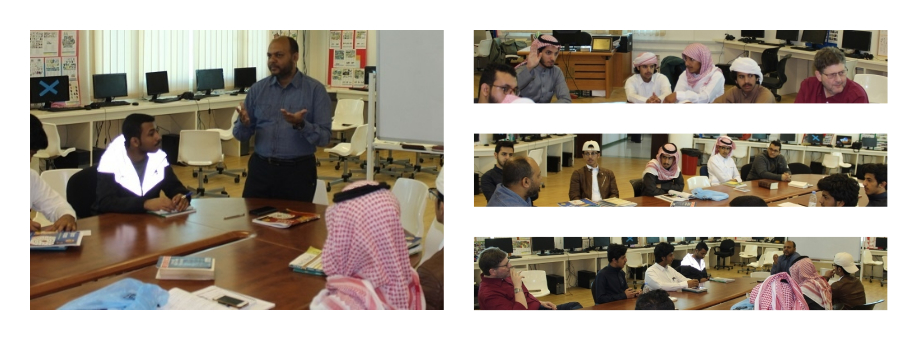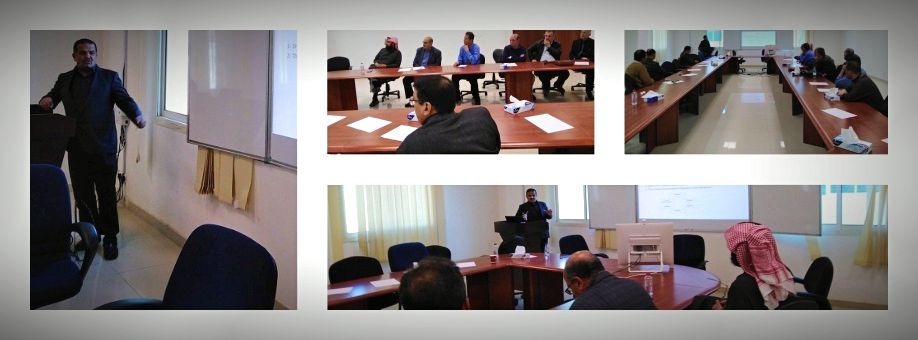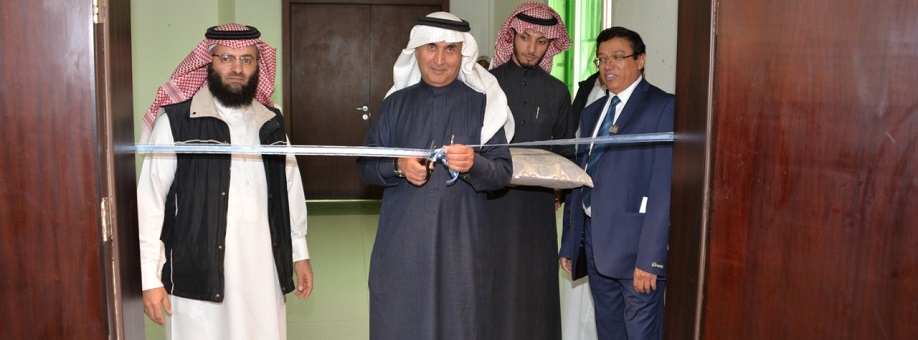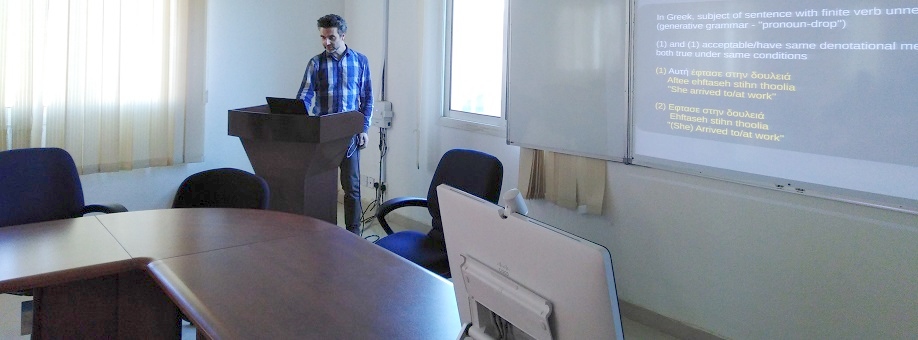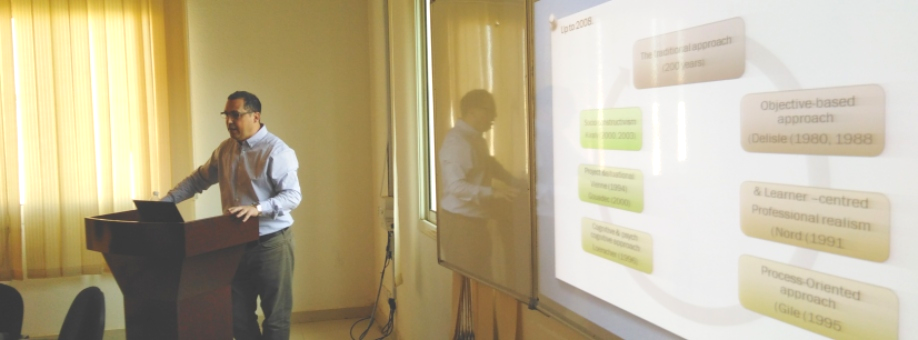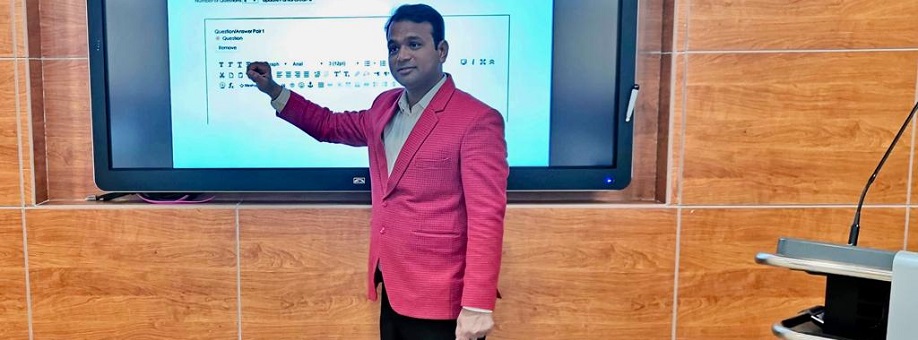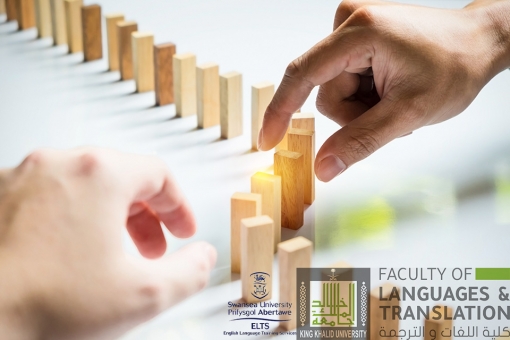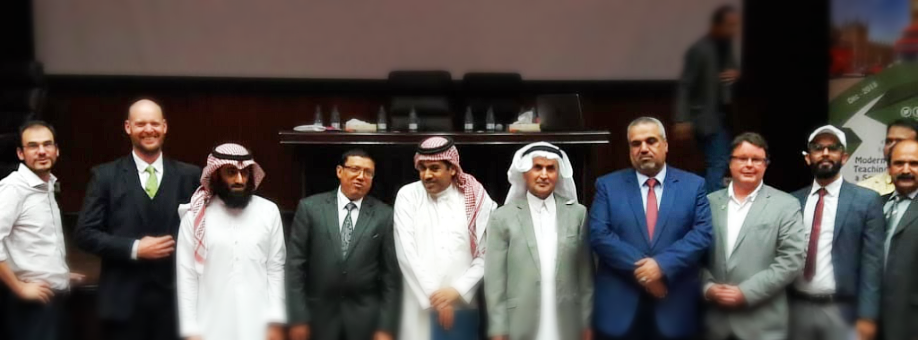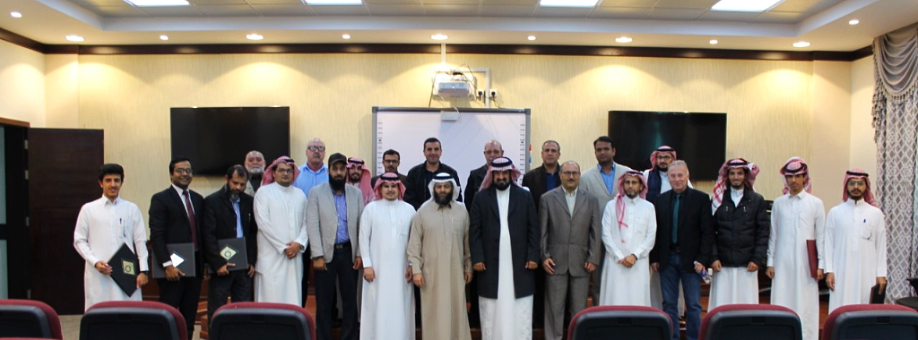News
The Women's English Club of the Faculty of Languages and Translation and the Deanship of Student Affairs held a workshop titled 'Time Management Is the Key to Success'. The workshop was prepared and presented by Mrs. Maram Almalki on Monday the 11th of February.
The workshop included discussions about the importance of time management as well as strategies for helping the students to manage their time, solving problems and basic skills for drawing and planning their goals. The workshop ended after encoring the students to brainstorm a real-life situation where they can use these skills.
Date:2/20/2019
Source : English Club
On the 19th of February, the English Club conducted another student workshop. The guest speaker was Mohammed Al Fuad. The topic was 'Becoming an Exceptional Student'. At the outset, Mr. Fuad told the students that they are all so fortunate for their opportunity to study at King Khalid University. He encouraged students to go after their dreams. Mr. Fuad reminded the students to see opportunities in setbacks and to follow their own path to success.
Mr. Fuad then said that the title 'Student' is in no way trivial. Everybody in attendance agreed that being a student is difficult. Burdensome course loads, complex material and never-ending exams challenge each pupil. Mr. Fuad noted that being a serious student requires hard work and dedication. He explained that consistency is key. 'Good habits make for good students. Plan your work and study times, and then stick to those plans' he stated.
The faculty are there to both teach and guide the students towards academic and career success. However, each student is responsible for his own path and the consequences of his actions. 'The teacher will help navigate, but the student is the driver' he noted. In sum, each student is ultimately the master of his own education.
Mr. Fuad asked the participants to serve as role models. Not every student is well motivated and dedicated to academic success. Mr. Fuad told the group 'It is your duty to try and help those students who suffer a motivational deficit. Do whatever you can to help them see the light'. He further explained that a successful academic career will help make them successful men'. Finally, Mr. Fuad gave examples of past university students who overcame adversities and succeeded in school and in their careers.
Date: 2/19/2019
Source: Dr. Charles Forman
The Women's English Club of the Faculty of Languages and Translation and the Deanship of Student Affairs held a program titled 'Winter Picnic' on Wednesday the 30th of January from 9 a.m. to 11 a.m in the inside hall of building C.
The program was opened by Dr. Suaad, Mrs. Safiah, Mrs. Maram and the members of the English Club welcoming the rest of the students. The program was filled with a lot of great inspirational ideas and discussions about the students' academic life. The students also prepared the food corner, ground seating area and some gifts to give to the students attending the program.
Source: English Club
Date:30/1/1019
Dr. Hasan Jaashan introduced his book about Stylistics at the seminar held on February 13, 2019, which was organized by the Language Research Center of King Khalid University. He started his presentation by showing the content of his book.
Dr. Jaashan, while highlighting the content of the book, spoke in detail about the relation between linguistics and literature, and what function stylistics has in understanding literature. He emphasized the significance of clear understanding of linguistics in appreciating literature, which, he added, involves perceiving the beauty of thoughts and expressions. He highlighted the fact that every writer has his or her honest and unique style of writing.
Dr. Jaashan also explained the features of the language of literature. Dr. Jaashan focused on his phonological and stylistic analysis of various literary texts.
The seminar was informative, interactive and a great success.
Date: 2/13/2019
Source: Mohammad Adil Siddique
On February 12th, there was a gathering of the English Club in the Language Enhancement Program (LEP) room at the main campus. The purpose of the meeting was to conduct another installment of 'Linguistics Hour'. The English Club Linguistics Hour is a continuing project to identify issues in English language learning, discuss methods for improving English language education, and to identify practical applications for the usage of English in the Kingdom of Saudi Arabia.
The speaker at the event was Faculty of Languages & Translation lecturer Faisal Alfadhil. Mr. Alfadhil has a close connection with the students in the department. After earning his master's degree at Florida Atlantic University, Mr. Alfadhil returned to the department as a lecturer and was recently appointed to the position of Director of Student Activities. Many of our students eagerly attended this presentation by our youthful, new colleague.
Director Alfadhil's presentation focused on writing systems. He began by exploring the historical origins and forms of written language in the context of an extension of spoken expression. He then reviewed the means by which orthography slowly developed over millennia and tracked these improvements through the modern era. He then explained how written language is one of humanity's most remarkable achievements, which has profoundly impacted almost every aspect of nearly every society on the planet. In the early days of human society, man was entirely dependent upon oral traditions. Written language allowed humans to create permanent records of useful information and sage advice for future generations. Historical, technical and philosophical information could be passed down without the inherent vagaries of centuries of oral storytelling. While early man's motivations to write are unclear, the importance of written language for society simply cannot be overstated.
Director Alfadhil then held a lively Q&A covering a variety of issues pertinent to writing and written language. Of particular interest was the discussion about 'Abjad' languages -- that is language containing only consonants and no vowels. Abjad languages (including Arabic) are very different from those that include vowels. Despite the fundamental difference, empirical evidence indicates that both types of languages are equally effective in all aspects of communication.
At the conclusion of Linguistics Hour, Director Alfadhil thanked all of the students and staff who participated. He further noted that 'Writing well will certainly help you succeed in your personal and professional endeavors. But also remember that writing is a precious gift from our ancestors. By writing you uphold a vital, centuries-old tradition of preserving records for those yet unborn'.
Date: 2/12/2019
Source: Faculty of Languages and Translation
Multimedia Source: Ayman Al-Faifi
On February 9th, College of Languages & Translation faculty members Mohammed Jabir and Erich Beer presented a creative writing workshop at Al-Janoub International School in Khamis Mushait. Attendees included many of the school’s students, teachers, and administrators.
Mr. Mohammed Jabir focused his presentation on the general philosophies and approaches to creative writing. He noted that humans are born storytellers. Creative writing is a natural extension of the societal need to inform, inspire and challenge others through stories. Mr. Jabir also reviewed various fictional writing styles, and explained how each type appeals to different audiences.
Mr. Erich Beer focused his time on practical issues in creative writing. He explained how most writers strive and suffer through the creative process. Mr. Beer has been teaching creative writing at the university for years. He offered many tips on ways to overcome common obstacles such as organization, writer’s block, editing and the like.
The workshop presenters thanked Al-Janoub International School for graciously hosting the event and subsequent refreshments. The presentations were well attended, and the participants showed great enthusiasm. Many expressed interest in having additional events in the future.
Date: 2-12-2019
Source: Faculty of Languages and Translation
On February 5th, there was a gathering of the English Club in the Language Enhancement Program (LEP) room at the main campus. The purpose of the meeting was to conduct another installment of 'Linguistics Hour'. The English Hour is a continuing project to identify issues in English language learning, discuss methods for improving English language education, and to identify practical applications for the usage of English in the Kingdom of Saudi Arabia.
The featured speaker at Linguistics Hour was Khalid Al-Qasemi, lecturer. Al-Qasemi recently earned his master’s degree in California, USA and is a recently promoted faculty member. He also served as the Director of Student Activities last semester. Given his educational background and close connection with the students, more than 30 attendees participated.
Al-Qasemi stressed the importance of good writing and reviewed the fundamentals of quality authorship. He covered the four basic requirements for proper writing: Grammar, vocabulary, spelling, and punctuation. He also explained that writing is like construction. That is, one begins a building block at a time. 'Words become sentences. Sentences turn into paragraphs. Paragraphs eventually become essays, articles, or books. That is the ultimate strategy for the complete expression of ideas', he said.
At the conclusion of Linguistics Hour, Al-Qasemi thanked all of the students and staff who participated, urging all students to work diligently to improve their writing skills. 'Although writing is difficult, good writers are valued and respected in all professions. The best way to improve your writing is to practice, and it is worth all of the effort', he said. He then encouraged all students to return to the next Linguistics Hour.
Date: 2/5/2019
Source: Faculty of Languages and Translation
Multimedia Source: Abdulelah Dhafer (Level 1 Student) & Saad Al-Shahrani (Level 4 Student)
On January 29, 2019, the Faculty of Languages & Translation (FLT) held a joint freshman orientation and departmental student awards ceremony. The event was hosted by English Club President, Abdulaziz Dahlan, supervised by Student Activities Director, Faisal Alfadhil, and led by the Dean of the Faculty of Languages & Translation, Dr. Abdullah Al-Melhi.
In recognition of the inaugural student activity programs, Dean Al-Melhi conducted a brief ribbon-cutting ceremony. The purposes of the ceremony were to celebrate the improvements in student activities and emphasize their importance to the incoming freshmen.
One of the main objectives of the freshman orientation is to help new students make the transition from high school to college life. Dean Al-Melhi welcomed the students and expressed his excitement at seeing so many new faces. He then introduced several members of the faculty and staff, each of whom gave a brief explanation of how they can assist the students. Academic Counselor, Dr. Dawood Mahdi, then gave a short presentation about what the students can expect from their teachers and the administration. He also provided further information on how the faculty and staff can assist the students.
Dean Al-Melhi concluded the freshman orientation by saying 'You are all embarking upon a wonderful journey. Undoubtedly, each of you will have accomplishments and setbacks, joy and frustration. By the time you graduate, you will have learned so much about your major and about life. All of us here in the department hope that, years from now, you will remember your brief time at King Khalid University as one of the most valuable experiences in your life'.
Following the orientation, Dean Al-Melhi, Vice Dean of the Faculty of Languages and Translation, Dr. Yahya Asiri, Chairman of the Faculty of Languages and Translation, Dr. Munassir Alhamami, and Counselor Mahdi conducted the student awards portion of the program. This semester the FLT recognized the following students for achieving a grade point average at or above 4.75:
Mohammed Al-Buhairi
Nasser Asiri
Rayan Jabar
Faisal Asiri
Nasser Al-Shahrani
Mohammed Al-Qahtani
Fuad Fayad
Hamad Ghannam
Mohanad Mushabab
Ahmed Ahmed
Abdullah Nasser
Abdulelah Hussein
Turki Shamakh
Abdulaziz Hussein
Fares Shafi
Khalid Hamza
Ali Mohammed
Asim Asiri
Khalid Shehri
Abdulrahman Ahmed
Hussam Asiri
Abdulaziz Hassan
Mohanad Al-Dosari
Ahmed Qadi
Abdulelah Saad
Mohammed Al-Shabi
Ibrahim Nasser
Mohammed Dhafer
Abdulmoshin Mohammed
Hazza Salem
Awadh Hassan
Wael Ahmed
Abdulrahman Asiri
Musa Mohammed
After the awards ceremony, Registrar at the Faculty of Languages and Translation, Nasser Hawamdeh, conducted a brief presentation concerning a variety of registration policies and procedures. He reviewed the methods by which students can register, change classes, and add/drop courses during the semester. This was important information as it covers frequently asked questions, especially among newer students.
Director Alfadhil then encouraged all of the students to participate in the English Club. The purpose of the extracurricular club is to help students improve their English skills and knowledge in an informal and collegial setting in which the focus is on teaching each other. 'The English Club can be a valuable and enjoyable means of improving your language skills while having fun. I encourage you to join the English Club at your earliest convenience', said Director Alfadhil.
At the end of the program, all of the participants enjoyed the refreshments. Students, both new and experienced, expressed their enthusiasm for their studies in the department.
Date: 1/29/2019
Source: Faculty of Languages and Translation
Associate Professor Michael Hadzantonis conducted a workshop on Linguistic Anthropological facets of language selection, which was organized by the Language Research Center of King Khalid University, on January 16, 2019. Here, the language of study was Greek, following a study and data collection in Athens, Greece in 2012.
The central premise of the study followed on from work by Duranti, which exposed that, in Italian, the act of dropping or including a subject pronoun constituent in/from any spoken construction, will alter the pragmatics of the sentence. In the Italian case, including the unnecessary subject pronoun will effect positive conceptions by speakers toward the referent. However, in the case of the Greek context, Hadzantonis argues that the opposite was found to be true. This metapragmatic conditioning of syntax aligns with work by Michael Silverstein in the 1980s, who discusses the importance of 'reference' in syntactic constituents, so to effect either deliberate or nondeliberate positioning of the subject referent, by the speaker.
This work constitutes the first part in introducing discourse analytic techniques in Linguistic Anthropology, and sits within a continual line of talks in the area of Research methods in Linguistic Anthropology, by Hadzantonis.
Date: 1/30/2019
Source: Mohammad Adil Siddique
Dr. Fouad Elkarnichi delivered a presentation titled Translator Education Practices in a University Context, which was organized by the Language Research Center of King Khalid University, on January 23, 2019.
Dr. Elkarnichi primarily focused on the status of translation in education. He, in his presentation, highlighted fundamental points on translator education, developments in Western-based translation pedagogy, issues raised in educational practices in Arab contexts, and his own experiences.
Dr. Elkarnichi also spoke about the misconception about translation. He said, while highlighting the history of translation, translation had been primarily the work of bilinguals, working practitioners and religious scholars. It, he added, had been used for centuries as simply a technique in ELF teaching and testing. 'Translation had not been considered as a worthy university discipline', said Dr. Elkarnichi.
Dr. Elkarnichi explained in detail, the chronology of approaches to translation (Traditional to Socio-constructivism). Dr. Elkarnichi finally spoke about his research he had conducted on translation programs in the MENA region using the mixed method research method, and he highlighted the interesting findings.
The seminar was informative and a great success.
Date: 1-25-19
Source: Mohammad Adil Siddique
قامت عمادة كلية اللغات والترجمة بتكريم كل من الأستاذ سعيد مشبب أبو مدره والأستاذ علي محمد حسن فارس وشكرهما على استحضار مراقبة الله عز وجل في عملهما وحرصهما على الكسب الحلال وذلك بتواجدهما الدائم وانضباطهما في الحضور والانصراف وإنجاز كل ما يسند إليهما من أعمال بإخلاص وأمانة سائلين الله عز وجل أن يبارك فيهما وفي جهودهما وأن يجزيهما خير الجزاء وترجو عمادة الكلية أن يكون التكريم حافزا لهما ولبقية الزملاء نحو المزيد من العمل والتميز.
On January 21, 2019, Dean of the Faculty of Languages & Translation, Dr. Abdullah Al-Melhi, presented two faculty members with distinguished service awards.
Dean Al-Melhi recognized Dr. Basim Kanaan for his four years of service as the department’s academic advisor. In his official capacity as student advisor, Dr. Kanaan worked tirelessly to guide and render help to many students on a wide variety of academic and personal issues.
Dean Al-Melhi also recognized Mr.Abdullah Al-Rezgi for his six continuous years of service as the English Language Center (ELC) director. The ELC provides intensive English instruction to students majoring in sciences and medicine.
The Dean conducted a brief awards ceremony in the presence of senior faculty members during the regularly scheduled department council meeting. Dr. Kanaan and Mr. Rezgi both received achievement plaques in appreciation for all of their diligent efforts and years of loyal service.
Date: 1/22/2019
Source: Dr. Charles Forman
On January 16, 2019, there was a face-to-face 'E-Learning Practitioners Training' organized by the Deanship of E-Learning available to all faculty members on Blackboard, which is one of the premier learning management systems in higher education. E-Learning Supervisor at the Faculty of Languages and Translation, Mohsin Khan, led the online training program. In attendance were some new faculty members from various colleges and locales. Mr. Khan provided some basic instruction for those who were not familiar with King Khalid University’s learning management system, Blackboard. Mr. Khan then conducted a training session in which he focused on the flipped classroom method. 'Blackboard is a powerful tool. If utilized to its maximum capabilities, our students have better learning outcomes and benefit greatly', said Mr. Khan.
Of note, Mr. Khan introduced the standards of the internationally acclaimed and recognized Quality Matters (QM) Rubric. QM provides certification to online courses that demonstrate a commitment to creating an environment of excellence and quality. Mr. Khan discussed how these standards could be implemented in online courses.
E-Learning Training Manager, Mohammed Jarallah, thanked all of the participants for their time and attention. He noted that E-Learning is an increasingly important aspect of higher education. The university is committed to maintaining the highest standards and best practices for modern college-level curriculum.
Date: 1/17/2019
Source: Faculty of Languages and Translation
The Faculty of Languages and Translation hosted training sessions to prepare our teachers to use the new textbooks effectively. On January 13th and 14th the Unlock series publisher, Cambridge University Press, conducted intensive training sessions for both male and female instructors at different locations. Dean of Faculty of Languages & Translation, Dr. Abdullah Al-Melhi, presided over and coordinated the whole program. ESL author & educator Peter Lucantoni commenced the workshop with his lively presentation. Mr. Lucantoni explained how the authors of this series reached out to teachers and learners to make sure they truly understood what they needed from a course. He reiterated that the Unlock series would motivate learners with engaging materials and visually stunning graphics in inspirational storytelling which would eventually develop their critical thinking skills in addition to language learning. Of note, Discovery Education videos are incorporated into the learning content, which is considered to be a brand new approach that equips learners with the skills and language needed for academic success.
King Khalid University Rector, Prof. Falleh R. M. Al-Solamy, Vice Rector of Academic Affairs, Saad Muhammad Du'ajim, and Vice Rector of Academic Development and Quality, Dr. Merzin Al-Shahrani, presided over the training sessions on day 2. After a brief closing ceremony, His Excellency Rector Al-Solamy wished all of the students and faculty great success with the new textbook series and course enhancement initiative. Dean Al-Melhi thanked the representatives of Cambridge University Press for their efforts and His Excellency Rector Al-Solamy and Vice Rector Du'ajim for their continued support and encouragement. 'The adoption of these new textbooks and the associated teaching techniques represent a momentous achievement for the English Language Center. We hope that it will unlock the potential of our students', said Dean Al-Melhi. He further noted that this textbook initiative was a long and difficult process. 'This project would not have come to fruition but for the dedication and persistence of my team's tireless work, and executive leadership support and encouragement of the initiative', he said.
The English Language Center at the Faculty of Languages & Translation has adopted and launched a set of new textbooks for numerous courses. These new materials are tailored to language learning for students enrolled in ENG 011, 012 and 019 English skills courses. This is an exciting development for the ELC as these new textbooks utilize cutting-edge language learning methods developed over many years. The textbooks are part of the 'Unlock' series by Cambridge University Press.
The Unlock series of books provides instruction on five essential academic language skills (reading, writing, listening, speaking and grammar). The textbooks employ a comprehensive approach to language learning in which students study all five subjects contemporaneously. This provides a near immersive exposure to the language that is of great help in achieving fluency. Moreover, the Unlock series also utilizes a 'scaffold' approach in which the materials help students progress up through a hierarchy of learning in accord with Bloom's Taxonomy. Unlock provides learners with the tools for developing the analytical and critical thinking skills necessary for mastering languages. The textbooks also stress the development of skills that will enable the students to speak and write proficiently at each level of language learning.
Unlock texts employ many different types of learning methods. The materials include many videos. These are helpful for both auditory and visual exposure to language usage. Unlock also prescribes a wide variety of both individual and group exercises designed to enhance language development. Moreover, Unlock is an effective tool for motivating students to learn. Most ordinary textbooks are dry and boring. The Unlock series focuses on study material that is engaging and sparks students' inherent curiosity. For example, the texts use interesting stories about real people and places in its lessons. Unlock is, in short, a critical component of an improved teaching strategy which will be of great benefit to our students. Adopting these new textbooks is one element of the university's goals of continuous improvement in all aspects of education.
The entire university offers its gratitude to Cambridge University Press. Textbooks are inherently expensive, especially those texts including state of the art educational materials and techniques. The university and Cambridge University Press worked very hard to provide these new textbooks at an affordable price. Ultimately, the parties found a way to sell these books to our students for 80 SR each. This is the lowest price for this series anywhere in the world. The university is so pleased to provide our students with optimal educational tools at a modest cost.
The Faculty of Languages and Translation is committed to providing the best possible language education to our students. The textbook initiative represents yet another success on the endless path of continuous improvement that helps make King Khalid University a world-class educational institution.
Date: 1/16/2019
Source: Md. Jahangir Alam
Multimedia Source: Sayed Mohammed Abdul Karim
The Faculty of Languages and Translation's Fall 2018 semester is officially closed. This first half of the school year has been marked with considerable successes and improvements in the college.
The college has made great strides in foundational quality improvements. Several course specifications in the department, syllabi, and student learning outcomes have been updated. Also, course specifications in the English Language Center have been modified in cooperation with the relevant colleges served by the English Language Center. These changes were implemented to improve the student experience and enhance the educational value for their future academic and career endeavors. In addition, measurement and evaluation tools for all courses have been implemented pursuant to the highest standards of leading universities throughout the world. Our international cooperation efforts have been expanded as evidenced by the continuing negotiations for a major joint venture with the University of Swansea led by Vice Dean, Dr. Yahya Asiri. 'The Faculty of Languages and Translation is committed to continuous improvement in all programs', said Dean Abdullah Al-Melhi.
The Faculty of Languages and Translation has realized many process improvements concerning examinations within the department and the English Language Center. The Exam Committee has put a great emphasis on maintaining test integrity and security. There are strict quality control guidelines to ensure that all examinations are consistent, thorough, and fair to the students. An emphasis on test security has greatly reduced incidents of cheating and accidental disclosure of testing material. In addition, the examination process went very smoothly at the end of the semester. Vice Dean Asiri said 'I thank the Exam Committee and all of our faculty for their hard work and emphasis on making the final examinations secure, fair, and an accurate measure of student performance. It is a difficult undertaking, but all of our faculty members are committed and achieved excellent results'. Chairman, Dr. Munassir Alhamami, noted that this semester saw a reduction in cheating cases due to tighter process controls and faculty vigilance.
The Faculty of Languages and Translation is dedicated to continuous improvement in language education and the student experience. We are at the forefront of program and process evaluation and development. Despite these successes, we will not rest on our laurels. We look forward to even more improvements in the semesters to come.
All students, faculty, staff, and administrators have certainly earned and need time to rest. Everybody have a great week off!
Date: 1/1/2019
Source: FLT Digital Ambassador
As part of the international cooperation initiative at King Khalid University, His Excellency King Khalid University Rector, Pro. Falleh R.M. Al-Solamy, was pleased to welcome a delegation from Swansea University in the United Kingdom. Swansea University is a world recognized top-400 educational institution and is Welsh in origin. In fact, in Wales, the university is also known as 'Prifysgol Abertawe' in the Welsh language.
Dr. Parfitt is the Head of the English Language Training Services. She, along with her entourage, visited the Faculty of Languages and Translation. Dean Abdullah Al-Melhi, Vice Dean Yahya Asiri, Chairman Munassir Alhamami, and ELC Director Musa Al-Ahmari led them on a tour of the labs, the LEP, the IELTS Center, and other related facilities.
In addition to touring the facilities, there was a roundtable discussion on international cooperation led by Dean Al-Melhi. 'We welcome our honored guests to Abha. Cooperation among universities from around the world is a worthy objective. We all have much to learn and to teach one another. In the spirit of international cooperation, we are most pleased to collaborate with Dr. Parfitt and Swansea University. We are most grateful to His Excellency Rector Al-Solamy for organizing and supporting this worthwhile endeavor. It is worth noting that other representatives from Swansea visited and toured other colleges within the university. These efforts are of mutual benefit to everyone at both universities', said Dean Al-Melhi.
Dr. Parfitt said 'We are privileged to be welcomed to King Khalid University. We plan to establish a mutually beneficial and on-going educational cooperation initiative with the Faculty of Languages and Translation. We hope to implement such useful projects like internship programs, faculty and student exchanges, and joint degree programs. Everyone we met at King Khalid University and in Abha were most gracious and inviting. We look forward to a long and productive relationship with King Khalid University'.
The Faculty of Languages and Translation is committed to developing our university, students, and faculty through international cooperation and bilateral agreements with top universities throughout the world.
If you are a representative of a foreign educational institution, organization, or enterprise and interested in establishing a memorandum of cooperation, please send an email to amalmelhi@kku.edu.sa.
Date: 12/15/2018
Source: Faculty of Languages and Translation
On December 8, 2018, the 4th Annual Forum was held which was titled Modern Methods in Teaching English as a Second Language in collaboration with Oxford University Press at Saudi German Hospital. The event was conducted under the supervision of the Faculty of Languages and Translation Dean, Dr. Abdullah Al-Melhi, and Dr. Mowafiq Al-Momani.
The purpose of the forum was to raise awareness of modern concepts of English language teaching. Dean Abdullah Al-Melhi began the program with a welcome speech. In his speech, he explained how teaching methods could be improved through such a forum. He reiterated that it would help share innovative ideas about modern pedagogy. He suggested that we make greater use of such events. Faculty development through forums and the like are an integral aspect of our goal of continuous improvement in delivering a world-class language education, he added. The participants included both male and female faculty members working at King Khalid University.
The morning session included a presentation by Mr. Zaid Ben Hamad from Oxford University Press titled Teaching ESP highlighting practical teaching with reference to English for Specific Purposes. He showed how to model a warm-up task, the importance of having proper knowledge of the specialism before designing an ESP course, and how to design a fact-sheet. The session included some activities with questions that actively involved the participants.
The afternoon session included six presentations.
Dr. Eman Alzaanin gave a presentation titled EFL Writing Instruction from a Cognitive Ecological Perspective. She highlighted pedagogical practices in L2 writing classrooms and L2 writing teacher cognition. She also explained the contribution of the cognitive-ecological model that gives insights into cognition networks, broader understanding types of knowledge, context, and stimulus for teacher cognition. The bottom line was the fact that in EFL writing instruction, a teacher must have a clear idea about ecology impact on the class.
Dr. Munassir Alhamami spoke on the subject of Digital Presentations in EFL Classrooms that focused on various ways to use digital presentations in class. He emphasized the need of appropriateness of material we choose, and understanding copyright issues before applying them in class. He showed how digital presentations facilitate the learning process by making difficult ideas easy, playing the role of ice-breakers. Later he showed the steps of creating such presentations by understanding rubrics.
Mr. Chris Harris spoke about Classroom Management in the context of Saudi Arabia that emphasized creating a rapport with students. Dressing appropriately may create a good impression, he added. Classroom management is successful, he said, if the lesson gives proper satisfaction and enjoyment in teaching. He also focused on how to address other related issues such as disruption, coming late, and not bringing books and pens. Some culturally sensitive topics, he said, must be avoided. He concluded that a happy teacher makes happy students.
Mr. Stephen Sampliner’s presentation focused on giving accurate instructions. It was titled How do You Measure a Successful Day of Teaching? The role of instructions might play an important role in determining how successful a lesson is, he said. He then highlighted some key aspects of giving instructions. He emphasized making use of visual demonstrations in giving instructions. He reiterated that instructions should be easy, direct and short.
Mr. Michael Maschmeier's presentation was about Writing in the Classroom. He began by the benefits of writing in class – observing and replicating real-world text. He emphasized involving students in writing a complete unified piece of writing instead of just getting them involved in language-related tasks. He explained the process of writing – pre-writing, making the first draft, revising and editing, and publishing and feedback. He also focused on self-editing, practicing writing long essays, academic essays, articles, cover letters, and emails.
Dr. Sara Sevinj Huseynova spoke about the Key Concepts in Language Assessment. She particularly highlighted the types of assessment and assessment principles. While talking about assessment principles, she explained reliability, validity, practicality, and washback. Teachers should have a clear idea about why, what, and how the assessment is done. She also focused on how feedback should be given to learners in a non-judgmental and unbiased way.
The attendees greatly benefitted from all the presentations. Then there was a Q&A session after each session in which many participants raised important issues, and all benefitted from the discussion.
Dean Abdullah Al-Melhi gave a concluding speech in which he emphasized sharing experience through such a forum. He thanked all of the participants, attendees and those working behind the scenes. The Faculty of Languages and Translation, he added, is committed to a culture of on-going improvement in language education and professional development in teaching. The dean, vice dean, and chairman are committed to holding forums such as this in support of this worthy objective.
The event was worthwhile and well-attended.
Date: 12-10-18
Source: Mohammad Adil Siddique and Mahmudul Haque
Multimedia Source: Mohammad Taisir Albukaai
On the 6th of December, members of the English Club presented various certificates of appreciation and awards to numerous faculty members and students. Teachers were honored for their extraordinary efforts in helping to develop the students' mastery of the English language. Many students were recognized for their efforts in creating and executing the programs.
The English Club thanked Dean Abdullah Al-Melhi, Vice Dean Yahya Asiri, and Chairman Munassir Alhamami for making the extracurricular programs and the awards ceremony possible. Student Activities Director, Khalid Al-Qasemi, explained that English language immersion events sharpens student language skills and strengthen the bonds among students, teachers, and staff. English Club President, upper-level student Abdulaziz Al-Shahrani, closed the event by thanking and congratulating all of the participants and supporters.
Date: 12/6/2018
Source: Faculty of Languages and Translation
Translator's Message is an initiative organized by Master degree students in Translation at the FLT female campus. It is an all-volunteer group, which is dedicated to providing in-demand translation services to the community. The participants' motivation is based on their deep passion for translation and commitment to civic improvement. They utilized this program to raise awareness of the importance of translation while simultaneously sharpening their translation skills in furtherance of their career aspirations.
This program began under the tutelage of Dean Abdullah Al-Melhi, the first supporter and advocate for the initiative. The volunteer translators go to both public and private schools to support education and language translation. They are also planning to provide services to a variety of civic organizations such as public ministries, and those projects are currently in the planning stages.
The team is working on standardization procedures. This will allow the volunteers to deliver translation services in a highly efficient manner. The aim is to utilize increased efficiency to expand into advanced assistive techniques such as videos, podcasts, electronic Q&A competitions, spelling bees, and bilingual referendums.
The team is currently comprised of 11 valued members and growing as follows:
Hanan Al-Shahrani (Founding Member);
Afnan Yahya (Founding Member);
Afrah Al-Jaber;
Fayza Al-Ahmari;
Ghada Asiri;
Maryam Al-Shomrani;
Noura Al-Hajla;
Noura Al-Shehri;
Rahma Al-Ahmari;
Shyma'a Hassan;
Wasayf Al-Qahtani.
Since its founding, Translator's Message has engaged with the public in a variety of events and capacities such as the community service activity on October 18, 2018. Hanan Al- Shahrani, Maryam Al-Shomrani, and Fayza Al-Ahmari delivered a presentation on languages and translation at the Eltamiz Alebday Private School in Khamis Mushait. Al-Shahrani started the presentation by identifying the objectives and the vision of Translator's Message. Then, Al-Shomrani explained why the English language is both relevant and important in Saudi society. Al-Ahmari discussed common mistakes and misconceptions in translation.
The team has engaged with the community on other occasions including:
On the 30th of October, Noura Al-Shehri and Afrah Al-Jaber visited Zoabaan School for girls in Mohayil;
On the 14th November, Rahma Al-Ahmari, Noura Al-Shehri, and Fayza Al-Ahmari visited Al-Abna School at King Khalid Air Base in Khamis Mushait;
On the 15th of November, Hanan Al-Shahrani, Maryam Al-Shomrani, and Wasayf Al-Qahtani visited Al-Oula High School in Khamis Mushait;
On the 15th of November, Afnan Yahya, Shyma'a Hassan, and Ghada Asiri visited Al-Thamna High School;
On the 22nd of November, Shayma'a Hasan visited Al-Thanya High School in Abha.
Date: 11-27-2018
Source: Faculty of Languages and Translation
Saja Al Ahmari and Jawaher Al Enzi, two MA students, delivered a presentation titled Translation and Culture at the seminar organized by the Language Research Center of King Khalid University held on November 28, 2018. The seminar was held on the King Abdullah Road campus. In their presentation, they focused on the cultural awareness required for proper translation. They introduced some such specialized terms relevant to the translation theory as ‘dynamic equivalence’, etc.
They showed some strategies for the knotty problem of finding equivalence for culture-specific terms. Such strategies included, but were not limited to, naturalization, neutralization, and compensation. Naturalization, they said, is a method of translating target cultural concepts by encoding them in their original target language forms. Compensation, on the other hand, they added, is a standard lexical transfer in which the meaning of the source language text is somehow lost in the process of translation. Compensation often results in ‘over-translation’ as opposed to ‘under translation’.
They tried to focus on the close relation between successful translation and understanding the culture of both the source language and the target language. They introduced some interesting examples from different cultures, and how ‘literalism’ does not work out the culture-related problems. One example was taken from German which uses a phrase meaning literally ‘to have tomatoes on one’s eyes’. This is rendered into Arabic as على عينيه غشاوة, obliterating any sense related to literal ‘tomatoes’. More interestingly, they drew the audience’s attention to the fact that some target texts excelled their source counterparts in quality. One example is Fitzgerald’s translation of Omar Al Khayyam’s Persian quadruplets into English in 1859. Despite the desperate attempt by other successors like Robert Graves and Omar Ali Shah in 1967, they failed to produce a translation that would replace Fitzgerald’s.
The seminar was an overall success.
Date: 11-29-18
Source: Mohammad Adil Siddique


